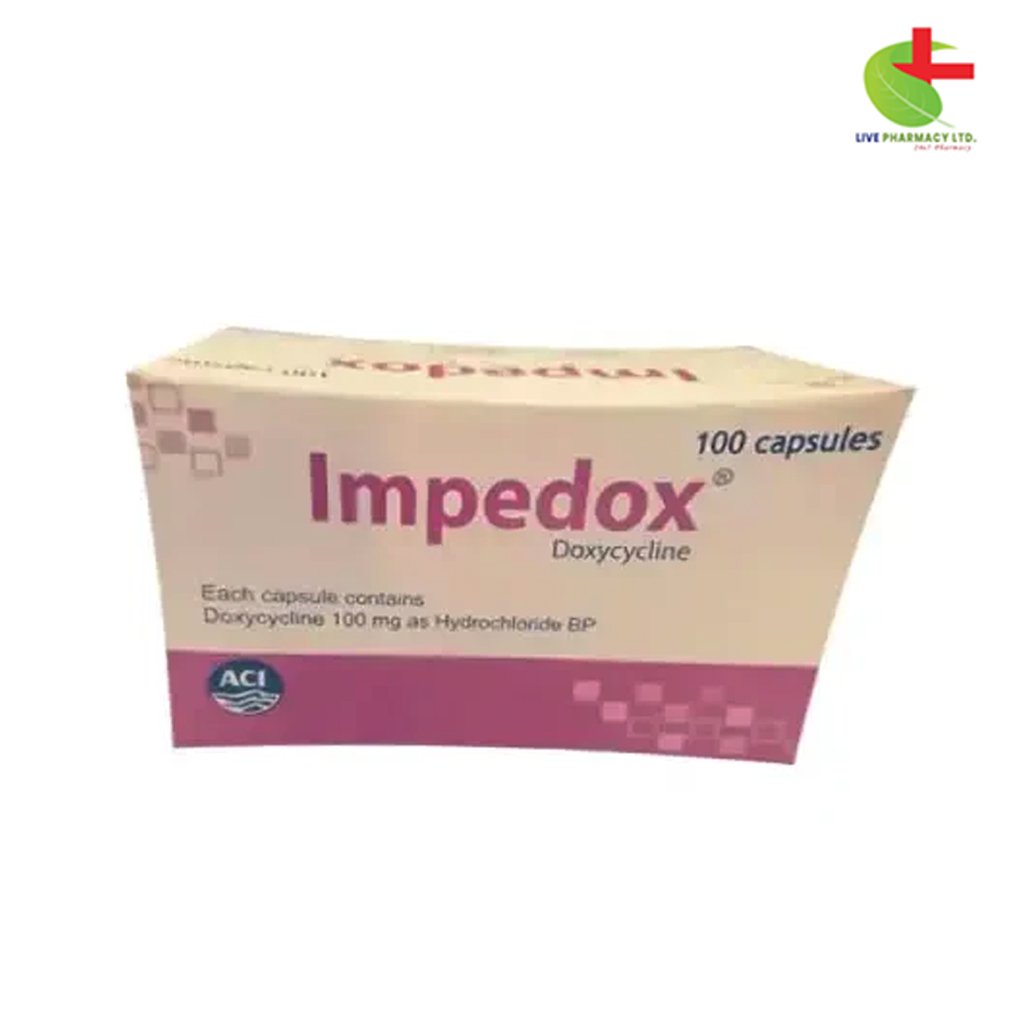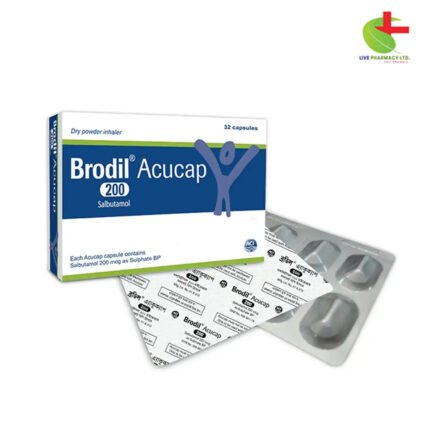Impedox 100
21.70৳ Strip
- Impedox: A broad-spectrum tetracycline antibiotic.
- Effective Against: Respiratory, gastrointestinal, chlamydial, and sexually transmitted infections.
- Mechanism: Inhibits bacterial protein synthesis.
- Alternative Use: Suitable for treating gonorrhea and syphilis as a penicillin alternative.
- Usage Guidance: Always consult a healthcare provider for proper dosage and administration.
 Brand
Brand
|
ACI Limited |
|---|---|
 Generics
Generics
|
Doxycycline Hydrochloride |
 Type
Type
|
Capsule |
Indications
Impedox is prescribed for infections caused by susceptible microorganisms, including:
- Respiratory Infections: Pneumonia, influenza, sinusitis, bronchitis, tonsillitis, and tracheitis.
- Gastrointestinal Infections: Cholera, traveler’s diarrhea, shigella dysentery, and acute intestinal amebiasis.
- Chlamydial Infections: Lymphogranuloma venereum, psittacosis, and trachoma.
- Sexually Transmitted Infections: Non-gonococcal urethritis, acute pelvic inflammatory disease, uncomplicated urethral, endocervical, or rectal infections, as well as gonorrhea, syphilis, pyelonephritis, and cystitis.
- Other Infections: Impetigo, furunculosis, inclusion conjunctivitis, brucellosis, tularemia, cellulitis, acne, and Q-fever.
Description
Impedox is a potent broad-spectrum antibiotic belonging to the tetracycline class. It effectively combats a diverse array of Gram-positive and Gram-negative bacteria, as well as spirochetes, mycoplasma, rickettsia, and mycobacteria. This antibiotic serves as an alternative to penicillin for treating gonorrhea and syphilis, primarily inhibiting bacterial protein synthesis.
Pharmacology
Doxycycline Hydrochloride is a semi-synthetic tetracycline antibiotic with extensive antibacterial activity. Known for its bacteriostatic properties, it shows heightened effectiveness against Staphylococcus aureus and Nocardia, including penicillin-resistant strains. Certain Gram-negative bacteria such as E. coli, Proteus mirabilis, and Klebsiella may also exhibit sensitivity to doxycycline. Additionally, it is effective against a significant percentage of anaerobic bacteria, particularly Bacteroides fragilis.
Doxycycline is effective against most strains of Haemophilus influenzae and is especially beneficial for infections caused by H. ducreyi, Actinomyces, Brucella, and Vibrio cholerae. It also targets a wide range of Rickettsiae and spirochetes, including Borrelia recurrentis, Treponema pallidum, and Treponema pertenue, as well as Plasmodium falciparum.
Dosage
- Typical Dosage: Start with 200 mg on the first day, followed by 100 mg daily for 7-10 days.
- Severe Infections: 200 mg daily for 10 days.
- Acne Treatment: 100 mg daily.
- Uncomplicated Chlamydia and Non-gonococcal Urethritis: 100 mg twice daily for 7-21 days (14-21 days for pelvic inflammatory disease).
Administration
Capsules should be taken whole with ample fluids during meals while sitting or standing.
Consult your doctor for proper medication usage.
Interactions
Absorption of doxycycline can be affected by antacids containing aluminum, calcium, or magnesium, as well as iron supplements and bismuth salicylate. Barbiturates, carbamazepine, and phenytoin may reduce doxycycline’s half-life. Additionally, concurrent use with tetracyclines can diminish the effectiveness of oral contraceptives. Patients on anticoagulant therapy may need dosage adjustments. Avoid using tetracyclines alongside penicillin.
Contraindications
Doxycycline is not suitable for individuals with a known hypersensitivity to tetracyclines. It is also contraindicated in children under 8 years, pregnant women, and breastfeeding mothers.
Side Effects
Possible side effects include nausea, vomiting, diarrhea, skin rashes, hemolytic anemia, and eosinophilia.
Pregnancy & Lactation
Doxycycline should be avoided during pregnancy due to potential staining and effects on fetal bone development. It can enter breast milk, so nursing mothers should refrain from breastfeeding while on this medication.
Precautions & Warnings
Tetracyclines can cause permanent tooth discoloration if used during tooth development (the latter half of pregnancy, infancy, and childhood up to 8 years). Therefore, their use in this age group is not recommended.
Therapeutic Class
Tetracycline antibiotics
Storage Conditions
Store all medications out of reach of children in a cool, dry place, away from light.













Reviews
There are no reviews yet.